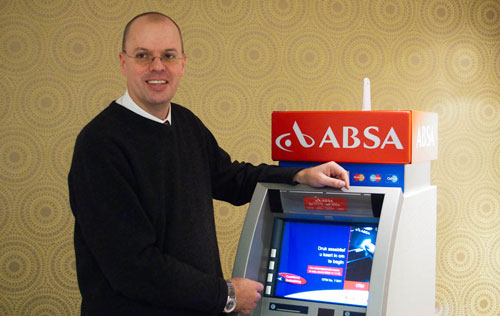
Absa has launched what it’s calling SA’s first “live user trial” of near-field communication (NFC) technology on mobile phones. The trial will kick off in mid-December and involve 500 of the bank’s own staff members, operating in a live commercial environment.
The system will use NFC capabilities with an EMV (Europay, MasterCard and Visa) card payment application to a handset, says Arrie Rautenbach, head of retail markets at Absa.
“The trial paves the way for consumer market utilisation of the mobile phone as a payment device by using … NFC technology. While this trial will facilitate low-value payments in retail and transit in early stages, we envision many more exciting new forms of mobile payment in the future.”
Absa has embedded MasterCard’s Paypass Tap and Go payment card on the handsets for the trial. This will allow participants to load funds into a prepaid store of value on a secure element on the phone, at point of sale, through Absa online banking site or at Absa ATMs.
The mobile payment system also contains the national department of transport data structure, which will in future allow more advanced payments in transit.
The application on the phone will store details of the commuter, the day and time, where they entered and exited the transit system — and use this information to calculate the fares.
Adrian Vermooten, deputy managing executive of Absa digital banking, says all the payment and NFC services that are available on the handset will be accessed from the mobile phone’s main menu, in addition to information about each service and customer support.
“By simply tapping one’s phone in front of a contactless NFC-enabled pay point, the value of the transaction will instantly be debited from one’s bank account,” says Vermooten.
He says the trial will allow participants to pay for goods at coffee shops, canteens and, later, at other service providers that are located at Absa’s head office in central Johannesburg.
Research In Motion’s BlackBerry models will be the initial handsets for mobile payment trials. The BlackBerry device will be equipped with an NFC wireless chip, making it well-suited for mobile payments.
“This trial is going to provide key insights that will prove crucial to refining the customer experience as we bring NFC on mobile to market,” says Vermooten.
In future, consumers will store any type of payment cards in their mobile wallet on their handsets, and either pay online by tapping the phone on a merchant’s reader or on a person-to-person basis, he adds. “This new technology is paving the way and building acceptance networks for mobile payments in future.”
Rautenbach says international experience and various research papers have shown that for NFC to become a reality, the close cooperation of major players in the “NFC ecosystem”, such as banks, network operators, retailers, cellular handset manufacturers and IT companies is required.
“As we learn from the practical, hands-on experiences of the trial, we will continue our discussions and deepen our relationships with the major players in the ‘NFC ecosystem’ to develop the commercial models, and extend the variety of payment instruments made available by the wallet,” says Rautenbach.
In July this year, Absa and Vodacom announced the formation of a strategic alliance to accelerate the pace of innovation in mobile financial services. One of the focus areas of this alliance is NFC. — Staff reporter, TechCentral
- See also: Absa NFC trial: all the details
- Subscribe to our free daily newsletter
- Follow us on Twitter or on Google+ or on Facebook
- Visit our sister website, SportsCentral (still in beta)




